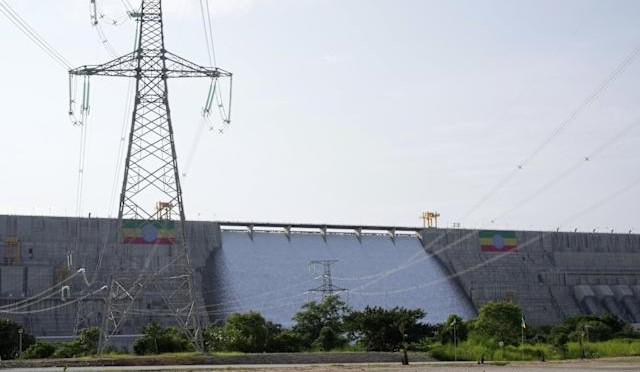Ethiopia on Tuesday inaugurated Africa’s largest hydroelectric dam, a nearly $5 billion project officials say will boost the economy, end frequent blackouts and support the country’s push for electric vehicles following a ban on gasoline-powered car imports.
The Grand Ethiopian Renaissance Dam, located on a tributary of the Nile River near the border with Sudan, is expected to generate more than 5,000 megawatts and double the country’s electricity output, according to government officials.
Reservoir waters flowed into the turbines during the launch ceremony, which was broadcast on large screens across the capital, Addis Ababa. Crowds in traditional attire danced and celebrated the event.
Prime Minister Abiy Ahmed called the dam a “big achievement” and said it demonstrated what African nations can accomplish.
Dozens of African heads of state and government, including South Sudan’s President Salva Kiir, attended the inauguration. Several expressed interest in purchasing power from Ethiopia.
“I am proud to announce we will soon be signing an agreement with the government of Ethiopia to receive electricity from the dam that will benefit our hospitals and schools,” said President Kiir.
Kenyan President William Ruto, whose country already imports Ethiopian electricity, said Kenya is pursuing a new power purchasing agreement based on the dam’s resources. He described the project as a “pan-African statement.”
“The dam exemplifies the scale and ambition of African-led infrastructure and aligns with the African Union’s vision of continental energy connectivity,” Ruto said.
The dam has long been a point of tension between Ethiopia and downstream countries, particularly Egypt, which fears reduced water flows.
Egypt relies almost entirely on the Nile for water and has repeatedly voiced concerns about the dam’s potential impact.
“There was no prior notification, proper consultations, or consensus with downstream countries, thereby constituting a grave violation of international law,” said Tamim Khallaf, a spokesperson for Egypt’s Ministry of Foreign Affairs. He called the dam an “existential threat.”
Addressing those concerns, Abiy said Ethiopia does not intend to harm its neighbors.
“I assure you that Ethiopia will never take away your rightful share,” he said. “The hunger of our brothers in Egypt, in Sudan, or anywhere else is also our hunger. We must share and grow together, for we have no intention of harming anyone.”
The project has become a symbol of national pride for many Ethiopians, despite years of regional controversy.




